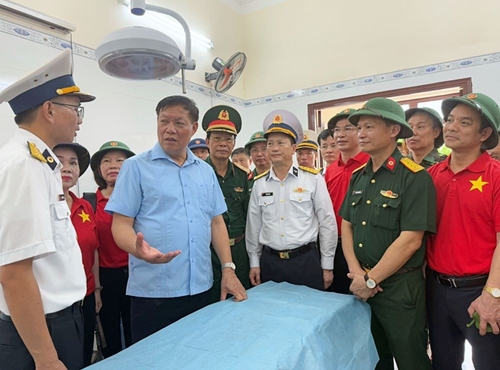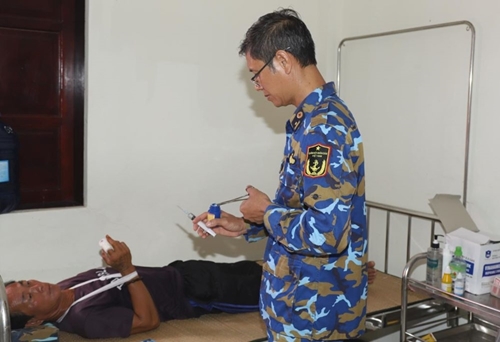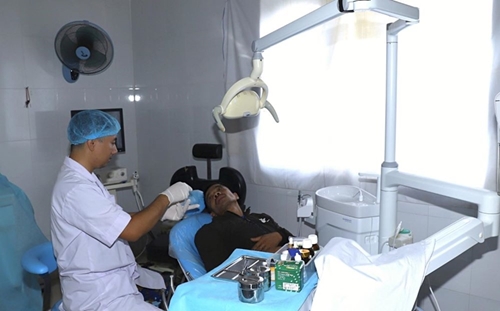The outcomes of this partnership affirm that the healthcare sector, especially military medicine, has truly become a strong pillar at sea, making vital contributions to the well-being of both military personnel and civilians, while supporting economic development and safeguarding the nation’s maritime sovereignty.
Strong homefront, steadfast frontline
In 2015, Bach Mai Hospital received a request from the Naval Medical Institute for technical assistance in hemodialysis. The hospital’s leadership viewed this not merely as a technical task but as a special political mission directly contributing to the defense of the nation’s sacred maritime sovereignty.
Since then, Bach Mai Hospital has supported naval medical forces through training, technology transfer, and capacity building for 2,900 personnel, especially in emergency resuscitation, cardiology, gastroenterology, nephrology, musculoskeletal medicine, diagnostic imaging, and more.
    |
 |
|
Leaders of the Ministry of Health visit and present gifts while listening to a report by doctors at Sinh Ton (Sin Cowe) Island infirmary on healthcare services for troops and civilians on the island, April 2025. |
Assoc. Prof., Dr. Dao Xuan Co, Director of Bach Mai Hospital, shared, “Over the past 10 years, in the spirit of a ‘strong rear, steadfast frontlines,’ more than 4,500 doctors and medical staff from Bach Mai Hospital have worked side by side with naval medical personnel in hundreds of field missions, thousands of training sessions, technology transfers, medical examinations, treatments, and health education campaigns. Over 10,000 naval officers and soldiers have benefited. Nearly 600 medical techniques have been effectively transferred, while 42,000 medical books, documents, and equipment have been delivered to naval units. These efforts vividly reflect the bond between healthcare workers and naval soldiers, and the alignment of professional duty with the sacred mission of national defense.”
In addition to Bach Mai Hospital, leading institutions such as Viet Duc Hospital, the National Hospital of Endocrinology, and Hanoi Medical University Hospital have also worked closely with the Naval Service to provide healthcare for troops and civilians in maritime and island regions, achieving significant results. Since 2015, the Naval Service has received substantial support from the Ministry of Health and hospitals in terms of personnel, infrastructure, and medical equipment. Each year, the Ministry sends over 100 top specialists to island locations in the Truong Sa (Spratly) Archipelago and DK1 platforms, demonstrating mainland solidarity and responsibility for those stationed in remote maritime territories.
Senior Captain Cao Van Son, Deputy Chief of the Department of Logistics and Technical Services of the Naval Service, stated, “Thanks to the collaboration and support of hospitals and agencies under the Ministry of Health, over the past 10 years, medical units on islands and DK1 platforms have provided free consultations and medications to more than 81,500 people; admitted 3,623 patients; handled 1,872 emergencies; performed 1,657 surgeries; and transported 151 critical cases to the mainland. Emergency care and specialist consultations via the telemedicine system, connecting mainland hospitals to nine island infirmaries, have served 1,044 patients, ensuring timely and effective treatment. In recent years, naval medical units have also partnered with Ministry of Health hospitals to conduct routine health checkups for troops, workers, and civilians in Truong Sa and DK1 platforms. These initiatives foster a strong sense of duty among healthcare providers and build trust among soldiers and residents alike.”
Closer cooperation to strengthen healthcare on sea and islands
In recent years, agencies and units from both the Ministry of National Defense and the Ministry of Health have effectively implemented the Prime Minister’s Decisions No.317/QD-TTg (February 7, 2013), approving the “Plan for Healthcare Service Development on Vietnam’s Sea and Islands to 2020,” and No.658/QD-TTg (June 8, 2023), approving the “Program for Healthcare Service Development on Vietnam’s Sea and Islands to 2030.” These decisions provide a legal basis for sustained investment and development of healthcare in maritime and island areas, contributing to a strong all-people national defense posture combined with people’s security in these strategic zones.
In line with these decisions, many practical initiatives have been implemented, such as the “Accompanying Fishermen at Sea” program. This includes fundraising to donate medicine cabinets to offshore fishing unions, providing free medical services to tens of thousands of residents in island districts and communes by the Vietnam Young Physicians Association, and delivering medical equipment and technical support to island healthcare centers.
    |
 |
|
Naval medical personnel providing medical examination and treatment for fishermen |
To ensure emergency response and patient transport for both civilians and military personnel in maritime and island areas, the Ministry of National Defense and the Ministry of Health, in coordination with provincial and municipal authorities, have established five civil-military medical centers in island districts. These centers are tasked with emergency services, patient transport, and medical care. Advanced oxygen generation systems and telemedicine connectivity with central hospitals have also been deployed to improve healthcare capacity and provide specialized care on the islands.
As part of this coordination framework, the Minister of National Defense issued a circular in 2016 (amended in 2020) regulating the use of military helicopters for emergency medical evacuations from remote and maritime areas. This policy has proven highly effective, enabling medical personnel on Truong Sa and DK1 platforms to receive timely professional support from the mainland, improving treatment outcomes and reducing the need for evacuation.
According to Assoc. Prof., Dr. Dao Xuan Co, surveys conducted by Bach Mai Hospital on the impact of its coordination programs in maritime and island areas showed that 100 percent of surveyed personnel considered the initiatives essential; 98 percent were highly satisfied; and 87 percent reported successfully applying techniques and knowledge in their units. These findings underscore the effectiveness and practical value of the coordination programs.
Dr. Dao Xuan Co affirmed that Bach Mai Hospital will continue to support maritime and island healthcare, especially by transferring expertise to naval medical units. The hospital will help the Naval Medical Institute evolve into a fully functional frontline general hospital; provide training in emergency and first-aid techniques; support the development of specialty departments; train core personnel based on practical needs; expand networks with other hospitals; and mobilize national resources for advancing healthcare in maritime and island regions. Bach Mai Hospital pledges to remain a committed partner and a strong medical pillar for naval medicine in safeguarding Vietnam’s maritime sovereignty.
    |
 |
|
Naval medical personnel providing healthcare for fishermen |
To effectively implement the healthcare development goals in the next phase of the coordination program between the Ministry of National Defense and the Ministry of Health, the Naval Service emphasizes the importance of further integrating civil and military medical services. This includes regularly updating regulations for coordinated emergency responses to epidemics and natural disasters. The Naval Service’s Logistics and Technical Department has proposed that the Ministry of Health finalize the legal framework for protecting the health of military personnel and civilians in maritime and island regions. It also recommended assigning healthcare personnel to infirmary units in the Truong Sa Archipelago under civil-military medical programs, ensuring improved healthcare for both troops and local residents.
Translated by Trung Thanh